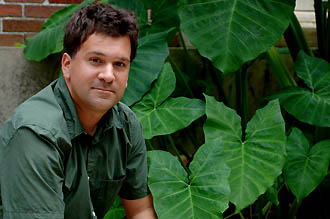Educators head to Tulane to learn jazz history
Whether sitting in lecture halls on campus, dancing to Kermit Ruffins' band or touring historical jazz landmarks around the city, a select group of educators from around the nation will immerse themselves in the musical culture of New Orleans in a program led by Tulane musicologist Matt Sakakeeny.

Tulane musicologist Matt Sakakeeny will lead a program in New Orleans' musical culture for K-12 schoolteachers, library educators and National Park Service interpreters. (Photo by Paula Burch-Celentano)
From July 8-14, 31 lucky participants in the “New Orleans, Jazz, and the American Public Sphere” seminar hosted at Tulane University will live and breathe music, both in and out of the classroom.
“I want teachers of history, social studies, English and other subjects to be aware of the central role that African American music has played in negotiating race and nationhood in the United States,” says Sakakeeny, an assistant professor of music who is heading the seminar.
Sakakeeny has lots in store for the educators, including a tour of significant jazz sites by architectural historian Jack Stewart and a slate of visiting artists such as pianist Tom McDermott, grassroots rapper Truth Universal and the Stooges Brass Band.
“We'll also take advantage of the faculty at Tulane with guest lectures by Hogan Jazz Archive director Bruce Raeburn, New Orleans Center for Gulf South director Joel Dinerstein, and ethnomusicologist Daniel Sharp,” says Sakaneeny. “I'm so excited for these teachers to become aware of the value of black music in American history, in the classroom and out in the city.”
The program is sponsored by the Gilder Lehrman Institute of American History, which every year offers more than 1,000 educators the chance to study American history with leading historians at top institutions throughout the United States and United Kingdom.
The New Orleans Center for the Gulf South at Tulane and the Music Rising Initiative of the Gibson Foundation are co-sponsoring the seminar, which will provide each participant with reading materials, room and board, transportation for tours and a travel stipend.
